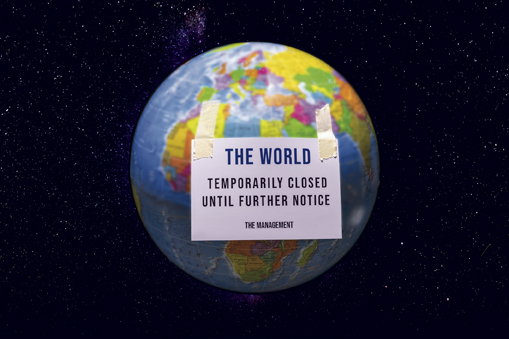Tactical Tech
By Chris Paradiso
BRANDS MUST THINK LONG TERM
Is continuing to market the business wise during these challenging times?
Cadbury launched its annual Easter marketing campaign in early March, showing a grandfather hiding Easter eggs for his grandchildren. No one at either the Cadbury brand or its marketing agency could have predicted that such a scenario would soon be dangerous.
The COVID-19 outbreak has changed every-thing, with people self-isolating and the government telling the rest of the population to stay home whenever possible.
Within days of launching of their campaign, Cadbury pulled the ad from TV, calling it “no longer appropriate” and saying it was working to replace it with spots “more mindful of the current climate.” Smart move by Cadbury.
There are other, greater risks for many brands, but the question of how to reach your audience and what message to send them, if any, is one of the biggest concerns right now.
The move highlights some of the challenges that marketers are trying to navigate as the country and the world at large adapt to the limitations put on “normal life” by the coronavirus. There are other, greater risks for many brands, but the question of how to reach your audience and what message to send them, if any, is one of the biggest concerns right now.
Marketing Week and its sister company Econsultancy surveyed over 850 brand ambassadors/marketers to discover their initial reactions to the coronavirus outbreak. The results (which were collated before lockdowns took effect) show that more than half are delaying/reviewing, or in some cases removing their campaigns. Some 62% are also delaying/reviewing their budget commitments and in some cases even slashing their budgets.
The scale of the outbreak has forced many compan-ies to issue profit warnings as demand dries up and uncertainty puts companies in an uneasy position. Retail stores, coffee shops, bars, gyms, theaters, and restaurants have been among the businesses ordered to close by state governments, while airlines have canceled the vast majority of flights and tour operators have effectively ceased operations.
Given the hit to both top and bottom lines for so many companies, many brands have cut discretionary spending, which often starts with marketing. Digital advertising is also taking a hit, with Twitter reporting that brands are pulling money out and putting in place sweeping keyword blacklists to ensure that they are not associated with the pandemic.
But I don’t believe that independent agencies should be cutting their already low marketing budgets because agency brands need to be out there, today more than ever. As Gary Vaynerchuk, chairman of communications company VaynerX, puts it, “The best marketing strategy ever is to care.” Your agency and its marketing strategy should be all about showing compassion and how your agency cares.
Most major brands fall into one of three categories regarding the impact of COVID-19:
- It has been catastrophic for their business (e.g., airlines, hotels, bars and restaurants)
- It has driven huge demand (e.g., supermarkets, broadband providers)
- It has created a drop in demand but not one that is catastrophic (e.g., retailers switching from in-store to online sales)
The right choice?
Is cutting your marketing budget the right choice? With the U.S. and global economies heading toward a major slowdown and at the very least a recession, many companies are trying to shore up their top lines by cutting marketing dollars. There is certainly little reason for brands like airlines and dine-in restaurants to be investing in activities that drive sales, but are independent agencies in the same boat as those kinds of businesses?
My answer is no, they are not—and they should redirect their marketing strategies by being laser-focused on what their messaging is socially, digitally and by print mail, without cutting the marketing budget.
The only sensible course for any agency that wants to maintain a presence through this uncertain time is to maintain its marketing spend, unless the agency is teetering on the edge of bankruptcy and it won’t be able to weather this storm.
If you can weather the storm, you should be putting money into your agency’s long-term brand building because that investment is for the recovery, not for today. Think of ways to show compassion by offering to help where help is needed and be the voice of reason, positivity and consistency in a time of uncertainty so you can come out on top when this crisis subsides. As Rand Fishkin, chief executive officer and co-founder of SEOmoz, says: “Don’t build links. Build relationships.”
Looking at the last recession (2008),we can learn from a number of examples where investment in brands paid huge dividends over the longer term. As rivals cut budgets, those that continue to invest will see their share of voice increase (the measure of the market that a brand owns compared to its competitors), and there is a strong correlation between share of voice and share of market.
A great example is Virgin Atlantic. In 2008, as the credit crunch hit, the airline’s passenger numbers fell and oil prices soared. Its response was to increase marketing spend and concentrate on brand building by launching its 25th anniversary campaign, Still Red Hot, which was most memorable for the iconic red uniforms worn by flight attendants.
How to advertise
For agencies that can afford it, continuing to advertise and market through the crisis will be key to recovery and long-term growth. Getting the message out that your agency cares will have a major impact on your long-term success.
The case of Cadbury shows that brands and consumers are cognizant of communications that sound off kilter with the current mood. David Beebe, a branded content producer, says that “content marketing is like a first date. If you only talk about yourself, there won’t be a second one.”
Start by calling each and every one of your clients to check in with them and see how they are doing. Yes, it can be a daunting task, but it will pay off. Don’t stop there. Put together an email campaign, along with a push notification, social, and print strategy. “Conversations with customers will increase sales, even if the product or service is never mentioned,” says George Farris, founder of Farris Marketing.
Agencies and brokerages that take the initiative to help will stand out and reap the long-term rewards because they are branding that they care. Carriers are stepping up and showing that they do care at times like this, with some offering refunds and discounts on personal auto policies. Carriers are looked at as the big bullies (time to show they are not), and we as agents and brokers must communicate with our clients about the good things carriers are doing. This a great time to pick up that phone and explain how their discount works.
This activity is already having an impact on the insurance world’s reputation. I’ve had many clients reach out to me to explain their personal situation; many have said that they do think differently about insurance carriers. Our industry needs more positivity because we do a lot of good for individuals and communities, but unfortunately it tends to be the negativity that gets showcased.
In this unprecedented time we have all become one because we all have a common enemy in COVID-19. In no previous slowdown or recession have we seen such an amazing level of individual and community response. It must continue—we must stay focused, and together we will recover from COVID-19.
As agencies and brokerages, we need to stay positive in our messaging and remember that people are struggling mentally, emotionally, and financially. It’s essential that we stress compassion and caring in these times because we can make a difference.
The author
Chris Paradiso is president of Paradiso Financial & Insurance Services in Stafford Springs, Connecticut. His agency won PIA National’s Excellence in Social Media Award in 2013. He also heads up Paradiso Presents, LLC, which provides social media consulting, seminars and workshops to help agencies thrive in the online marketing world. Contact Chris via email at cparadiso@paradisoinsurance.com.






